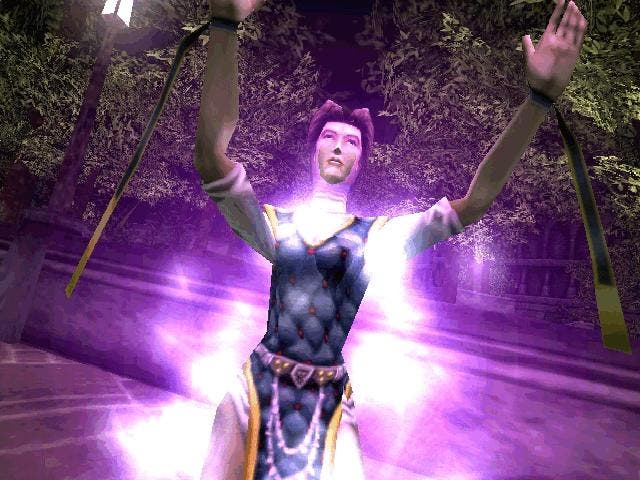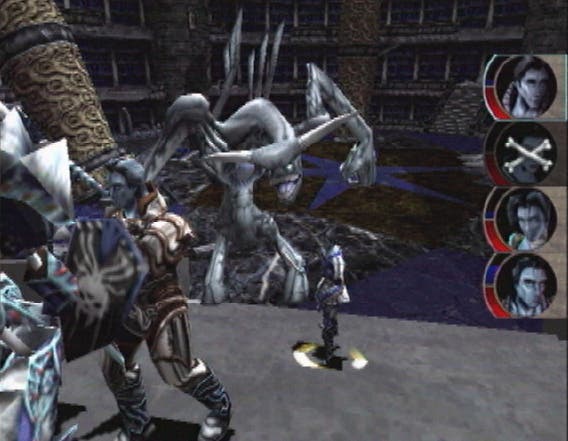Summoner
Review - the PlayStation 2 welcomes its first truly great RPG

Bestiality!
Hype. I hate the word, but unfortunately there is no other way to explain the fanfare surrounding the release of Summoner, because good though it is, it can never escape the carniverous attentions of the press. If you were expecting a typical console RPG, think again. Summoner is a major departure, heavy laden with text and a deep, evolving storyline. The game centres on a young lad called Joseph, who has the power to summon ethereal demons to do his bidding. Unfortunately he's denied himself the powers for a long time, because as a child, while inexperienced, he accidentally slaughtered his entire hometown. Which needless to say didn't go down too well. The game is filled with bizarre plot twists surrounding the progress of young Joseph and his three companions. The levels system that controls your troupe's powers is one of the game's strong points. You get to choose which of the character's skills is improved as a result of your experience, and since only certain characters can wield certain weapons and special abilities, it's essential to afford each of them equal priority. The battle system borrows heavily from last year's Squaresoft PlayStation smash hit Vagrant Story, using real-time and turn-based combat allowing you to perform Chain Attacks by pulling your weapon in various directions with the D-Pad as you strike. There is a complex magical association between all living creatures, weapons and such that becomes a key factor in how much damage your attacks can do, as well. Think of it as Summoner's version of The Force.

Furry
Obviously the game picks up once Joseph drops his vow and starts summoning again. The beats Joseph pulls out of the ether are monstrous allies in combat - you can opt to use them in battles as a token fifth character, but the obedience of these creatures depends on Joseph. In other words, if he gets knocked out the big beast might reconsider who it's attacking. Visually Summoner is a work of art thanks to Volition's implementation of full-scene anti-aliasing. After problems with the technology last year many were sceptical of the developer's ability to make Summoner live up to its billing, but whatever they've done it looks spectacular with a smooth, unblemished 30 frames per second and no discernible jagged edging. I don't personally think that Summoner is the most visually impressive game on the PlayStation 2, but the quality of modelling, environment and texturing is almost second to none throughout. Thanks to the overly complicated graphical engine though, draw distances are very disappointing. Characters also occasionally look a bit blocky, although this has more to do with a lack of polygons than a failure to apply anti-aliasing properly. Throughout the game, the only other engine or graphical issues we encountered were the mildly depressing load times when entering a new town or city, and occasional problems with clipping, where text bubbles go through walls and the like. When in full flow though, we had no concerns about framerate drops and the like, which appeared minimal. By all accounts, this is a pretty decent PAL translation.

Melodious
Like most console RPGs one of Summoner's most devoted aspects is its musical score. During the intense cinematic cut scenes it is a roaring success, and supplements the game's style and execution perfectly. The battle themes are top, and things are very atmospheric thanks to the soundtrack. Character speech is also used during cut scenes, and the game boasts some intelligent voice acting. The script-writing isn't atrocious either, which is a good thing due to the large amounts of text used, that's for sure. It's unsurprising that Volition chose not to voiceover the entire game, because there really would have been too many bit parts to play and words to say in general. The major concern we had with the game as a whole was that occasionally there did seem to be too much to say and too many people to consult with. For instance, while it's very true that in an average town people would have a lot more to say to a group of mystical strangers than "There's something spooky going on in this town - mark my words," or a similar RPGism - having to speak to so very many people at length can become quite tedious and detrimental to the general experience of playing Summoner. On several occasions I simply forgot who I had and hadn't spoken to (particularly between saves) and had to wade through reams of text again to figure out where I was going.

Conclusion
All right, so ultimately Summoner is an accomplished RPG, with more text than most to delve into. I don't like spoiling the storyline by giving away massive hints during my appraisals, but I will say that I found it occasionally mesmerizing, and for the most part very exciting. There have been a lot of excellent console RPGs in the last year or so, and Summoner does enough of its own thing to be worth buying independently. It's hardly a killer app with which to sell the PlayStation 2, but it definitely has a knack. At about 30 hours from start to completion with plenty of diversions along the way, it offers a lot more gameplay than some other early PS2 titles, and probably about the right amount for the average console gamer in general. Titles that stretch into the 50s and 60s are often just too long and drawn out for most to consider playing, but 30 is a reasonable effort. It's not really fair to bash Summoner too much for its various shortcomings, because although they restrict it from living up to the cast moulded for it by a year of hype, they aren't damaging enough to force gamers away. Having completed Summoner, I feel much the better for it, and I think you will too. With Onimusha due to hit within the month though, you could be forgiven for letting Summoner pass you by.

